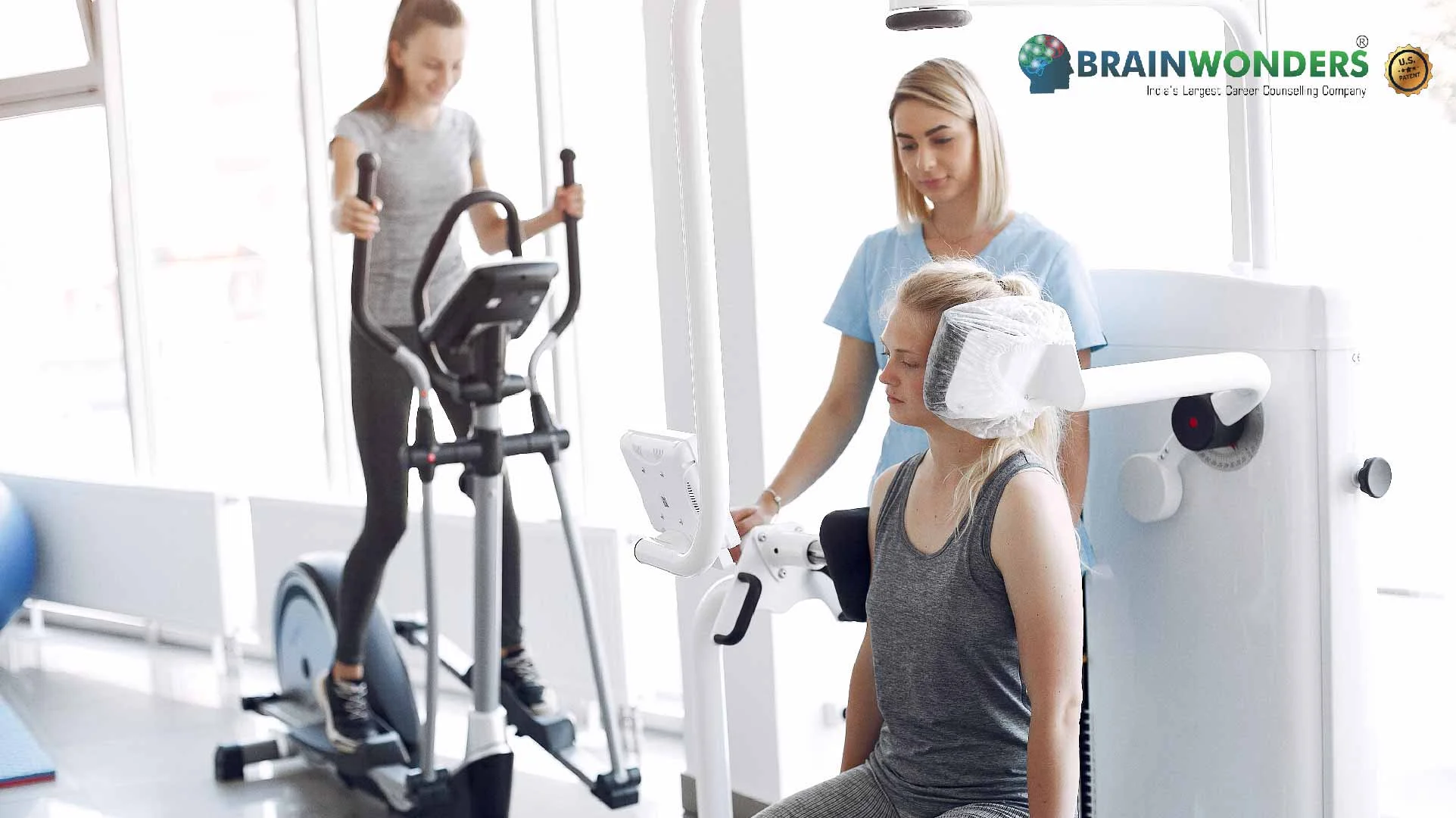How to become a Physical Therapist
Overview, Courses, Exam, Colleges, Pathways, Salary

Overview
Who is Physical Therapist ?
A physical therapist specializes in treating individuals with physical impairments, injuries, or conditions that affect their ability to move and function. These professionals are crucial in helping patients recover from injuries, regain mobility, manage pain, and improve overall physical well-being. Physical therapists assess patients' conditions, develop personalized treatment plans, and provide hands-on interventions to restore optimal movement and functionality.
They utilize various techniques, including therapeutic exercises, manual therapy, electrical stimulation, and assistive devices, to address musculoskeletal, neurological, and cardiopulmonary impairments. Physical therapists also educate patients about their conditions, teach them exercises for home management, and guide injury prevention and self-care. They work in various settings, including hospitals, rehabilitation centres, private clinics, sports medicine facilities, and home healthcare agencies.
Collaboration with other healthcare professionals, such as physicians, occupational therapists, and speech therapists, is often part of their practice. With their expertise in promoting physical health, functional recovery, and improved quality of life, physical therapists make a significant impact in helping individuals of all ages overcome physical challenges and achieve their maximum potential.
Typical day at work
What does Physical Therapist do?
- Patient Evaluation: Physical therapists assess patients by reviewing their medical history, conducting physical examinations, and using diagnostic tests to determine the nature and extent of their condition or injury.
- Treatment Planning: Based on the evaluation, physical therapists develop personalized treatment plans tailored to each patient's needs. These plans include specific goals and interventions to address functional limitations, relieve pain, and improve mobility.
- Hands-On Interventions: Physical therapists provide hands-on interventions to patients, which may include therapeutic exercises, manual therapy techniques, joint mobilization, soft tissue mobilization, and specialized equipment to improve strength, flexibility, balance, and coordination.
- Rehabilitation: They guide patients through rehabilitation programs to restore optimal function, mobility, and independence. This may involve exercises, stretching, gait training, and other techniques to enhance physical capabilities.
- Pain Management: Physical therapists use various pain management techniques such as heat or cold therapy, electrical stimulation, ultrasound, and specialized exercises to reduce pain and improve patients' comfort.
- Patient Education: Physical therapists educate patients and their families about their condition, treatment options, and self-management strategies. They guide exercises, home care techniques, and injury prevention to promote long-term well-being.
- Collaboration: Physical therapists often work as part of a healthcare team, collaborating with physicians, occupational therapists, speech therapists, and other professionals to provide comprehensive care and facilitate the patient's overall recovery.
- Monitoring and Adjusting: Physical therapists regularly monitor patients' progress, adjust treatment plans as needed, and motivate patients to achieve their goals.
Abilities and Aptitude needed
What are the skills, abilities & aptitude needed to become Physical Therapist?
- Knowledge of Anatomy and Physiology: Physical therapists must have a strong understanding of the human body's structure and function, including musculoskeletal, neurological, and cardiopulmonary systems.
- Clinical Assessment: They need to possess skills in conducting thorough patient evaluations, including history-taking, physical examinations, and interpreting diagnostic tests to develop accurate treatment plans.
- Treatment Techniques: Physical therapists should be proficient in various treatment techniques, including therapeutic exercises, manual therapy, modalities (such as ultrasound and electrical stimulation), and assistive devices, to address patients' specific needs.
- Communication and Interpersonal Skills: Effective communication is vital for building rapport with patients, understanding their concerns, and explaining treatment plans. They should be able to convey complex medical information clearly and compassionately.
- Problem-Solving and Critical Thinking: Physical therapists should have strong problem-solving abilities to assess patients' conditions, analyze their functional limitations, and develop appropriate interventions. They need to think critically and adapt treatment plans as needed.
- Empathy and Patience: Physical therapists work closely with patients who may be in pain or experiencing physical limitations. They must demonstrate empathy, patience, and a compassionate approach to support and motivate patients throughout their rehabilitation journey.
- Physical Stamina: This profession requires physical stamina, as physical therapists may need to assist patients in performing exercises, provide hands-on interventions, and spend prolonged periods on their feet.
- Continuous Learning: Physical therapy is a constantly evolving field. Physical therapists should be committed to lifelong learning, staying updated with advancements in research, treatment techniques, and evidence-based practices.
- Teamwork and Collaboration: Physical therapists often work as part of a multidisciplinary team. They should be able to collaborate effectively with physicians, occupational therapists, speech therapists, and other healthcare professionals to ensure coordinated patient care.
Salary
Salary for Physical Therapist?
Salary of A Physical Therapist is as follows :
- Minimum Monthly Salary: The minimum monthly salary for an entry-level physicist may vary based on factors such as experience, location, and the type of employer. It could range from INR 25,000 to INR 40,000 or more in India.
- Maximum Monthly Salary: Highly experienced and well-qualified physicists, particularly those in senior positions, research institutes, or with specialised expertise, may earn a monthly salary ranging from INR 70,000 to INR 1,50,000 or more.
- Annual Salary: The annual salary for entry-level physicists could be approximately INR 3 lakhs to INR 6 lakhs per year. Experienced and skilled physicists may earn a maximum yearly salary ranging from INR 10 lakhs to INR 20 lakhs or more.
- Highest-Paying Jobs and Scope: The highest-paying jobs for physicists are often found in research institutions, universities, government laboratories, and corporate research and development centres. Physicists with specialised expertise in particle physics, astrophysics, quantum computing, or materials science may have more lucrative opportunities. The career scope for physicists is promising, as their expertise is in demand across various industries, including technology, aerospace, defence, and renewable energy. With ongoing advancements in science and technology, physicists play a crucial role in advancing knowledge and innovation and solving complex challenges society faces.
Pathways
How to become an Physical Therapist?
Entrance Exam
Entrance Exam for Physical Therapist ?
Courses
Which course I can pursue?
Best Colleges
Which are the best colleges to attend to become an Physical Therapist?
Industries
Which Industries are open for Physical Therapist?
- Hospitals and Clinics: Physical therapists are commonly employed in hospitals and outpatient clinics, providing rehabilitation services to patients recovering from surgeries, injuries, or medical conditions.
- Rehabilitation Centers: Many physical therapists work in specialized rehabilitation centres that provide comprehensive care to individuals with specific needs, such as orthopaedic rehabilitation, neurological rehabilitation, or cardiac rehabilitation.
- Sports Medicine: Physical therapists can work in sports medicine clinics, athletic training facilities, or with sports teams, helping athletes recover from injuries, improve performance, and prevent future injuries.
- Home Healthcare: Some physical therapists work in home healthcare settings, providing rehabilitative services to patients in their own homes, particularly for those who have difficulty accessing outpatient facilities.
- Geriatric Care: Physical therapists are vital in senior care, working in nursing homes, assisted living facilities, and other aged care settings to help older adults maintain mobility, manage pain, and enhance their quality of life.
- Occupational Health: Physical therapists may work in occupational health settings, collaborating with employers to prevent work-related injuries, rehabilitate injured workers, and promote workplace ergonomics.
- Education and Research: Physical therapists can pursue careers in academia or research institutions, teaching future therapists, conducting research, and contributing to advancements in the field.
- Private Practice: Some physical therapists establish private practices, providing rehabilitation services directly to patients in a personalized setting.
internship
Are there internships available for Physical Therapist?
- Clinical Rotations: Physical therapy programs typically include clinical rotations where students gain practical experience in various healthcare settings under the guidance of experienced physical therapists. These rotations allow students to apply their knowledge, develop clinical skills, and learn from different patient populations.
- Hospital Internships: Hospitals often offer internships or volunteer positions for students or recent graduates to gain exposure to different areas of physical therapy practice, such as orthopaedics, neurology, paediatrics, or acute care. These internships provide opportunities to work alongside experienced therapists and gain insight into the clinical workflow.
- Rehabilitation Centers: Rehabilitation centres or facilities may offer internships for students or entry-level physical therapists. These internships focus on specialized practice areas, such as spinal cord injury, stroke rehabilitation, sports medicine, or geriatric care.
- Research Internships: Research institutions or academic centres may provide internships or assistantship opportunities for physical therapists interested in research. These internships allow individuals to engage in research projects, assist in data collection and analysis, and contribute to scientific publications.
- Volunteer Positions: Volunteering in healthcare settings, such as outpatient clinics, community health centres, or nursing homes, can provide practical experience and exposure to physical therapy.
Career outlook
What does the future look like for Physical Therapist?
The future for physical therapists is promising. With an ageing population, increased emphasis on preventive care and wellness, and advancements in healthcare technology, the demand for physical therapy services is expected to grow. Physical therapists will play a vital role in helping individuals recover from injuries, manage chronic conditions, and improve their quality of life. The evolving healthcare landscape offers opportunities for specialization, interdisciplinary collaboration, and the integration of telehealth and digital solutions, expanding the scope and impact of physical therapy practice.




.webp)


